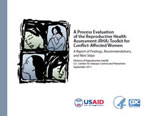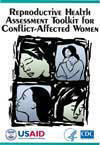Reproductive Health in Crisis Situations
Among the world’s 34 million displaced people, approximately 80% are women and children and are vulnerable to abuses and negative health outcomes during crisis. Women often become heads of households because they are widowed or deserted during displacement and become sole providers and caretakers of their families. It is essential to have appropriate reproductive health services that will—
- Ensure safe pregnancies and deliveries.
- Meet family planning needs.
- Prevent and treat sexually transmitted infections (STIs) and HIV/AIDS.
- Respond to and prevent gender-based violence (GBV).
Understanding the reproductive health needs of conflict-affected women will enable organizations to implement and enhance programs and services to improve the health of women and their families. The Reproductive Health Assessment Toolkit (RHA) for Conflict-Affected Women provides user-friendly tools to quantitatively assess the reproductive health needs of conflict-affected women aged 15–49 years. The RHA Toolkit enables field staff to collect data to inform program planning, monitoring, evaluation, and advocacy. It promotes using the collected data to enhance services and improve the reproductive health of women and their families.
A Process Evaluation of the Reproductive Health Assessment (RHA) Toolkitfor Conflict-Affected Women: A Report of Findings, Recommendations, and Next Steps [PDF – 760KB]

DRH conducted a process evaluation in 2009 to examine if the toolkit provides necessary and useful tools to guide program staff in collecting reproductive health data that inform program planning in crisis settings. In this report we present the results of that evaluation, including an examination of the factors that affect the use of the RHA Toolkit, and provide recommendations to sustain the RHA Toolkit post funding.

The RHA Toolkit includes the following:
- Survey team training manual
- Sampling instructions
- Questionnaire
- Public domain data entry program (CSPro)
- Pre-programmed analyses
- Suggestions for data use
The toolkit collects information about the following:
- Safe motherhood (current and past childbearing)
- Family planning
- Sexual history
- Sexually transmitted infections (STIs)
- HIV/AIDS
- Gender-based Violence GBV
- Female genital cutting
Target Users for the RHA Toolkit
- Government
- Non-governmental organizations (NGOs)
- United Nations (UN) agencies
- Independent research consultants
- Others interested in providing reproductive health services
Download RHA Toolkit
Reproductive Health Assessment Toolkit (RHA) for Conflict-Affected Women Presentation [PDF – 7.14MB]
Chapter 5 Analysis Guide: See updated files listed below
Note: Appendix D No longer included in the RHA Toolkit
Download RHA Toolkit by Chapters
RHA Toolkit Cover [PDF – 1.29MB]
RHA Toolkit Introduction [PDF – 241KB]
Chapter 1 Introduction [PDF -150KB]
Chapter 2 Planning Checklist [PDF – 477KB]
Chapter 3 Sampling Instructions [PDF – 413KB
Chapter 4 Training Manual [PDF – 666KB]
Chapter 5 Analysis Guide: See updated files listed below
Chapter 6 Suggestions for Data Use [PDF – 237KB]
Chapter 7 Evaluating Survey Implementation [PDF – 186KB]
The RHA Toolkit Chapter 5 Analysis Guide was updated in 2011. Download the updated questionnaire and analysis tables below.
Updated Chapter 5 Analysis Guide
Sexual History and STIs [PDF – 239KB]
Gender-Based Violence [PDF – 443KB]
Appendix A Budget Template [PDF – 168KB]
Appendix B Random Numbers Table [PDF – 297KB]
Note: Appendix D No longer included in the RHA Toolkit
Appendix C Training Handouts [PDF – 1.48MB]
Appendix E Practice Exercises [PDF – 247KB]
Appendix F Locator and Consent Form [PDF – 519KB]
Appendix G RHA Toolkit Questionnaire [PDF – 955KB]
Appendix H Final Report Template [PDF – 167KB]
RHA Online Training
CDC has developed three Web-based trainings related to the RHA Toolkit—
- Introduction to the RHA Toolkit.
- Data use.
- Understanding sampling methods.
Using Toolkit Data to Meet Family Planning Needs
Data from the RHA Toolkit can be used to estimate the quantities of contraceptives needed in the surveyed location, using CDC’s CastCost tool. This user friendly spreadsheet also will provide an estimate of the cost of the needed contraceptives. CastCost tool is available in both English and Spanish.